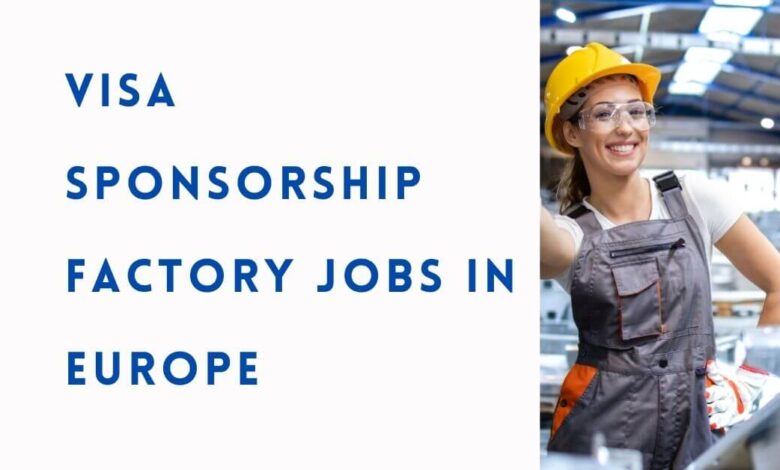Visa Sponsorship Factory Jobs in Europe 2024 – Apply Now

A considerable number of individuals are in pursuit of stable employment due to the volatile nature of the global economy. If you could effortlessly work in a European factory, a sponsorship visa would be an absolute necessity. If a prospective employer sponsors your visa, you would be eligible to work in any European manufacturing facility.
Employment in a factory is an excellent entry point into the European labor market. Due to the dynamic nature of the global economy, individuals seeking employment would do well to remain informed about the latest developments in their desired industries and fields. Continue reading to discover the requirements for obtaining a factory job in Europe that will bolster your visa application.
Check Also: Free Visa Sponsorship Jobs in Europe 2024 – Apply Online
Details of Visa Sponsorship Factory Jobs in Europe
Generally, manufacturing jobs necessitate the operation of tools and machinery. They serve as a remarkable foundation for a prosperous professional journey. These entities provide economic benefits, a sense of stability, and an ideal foundation for individuals seeking to venture into the manufacturing industry. In European manufacturing, a high school diploma or an internationally recognized equivalent is often sufficient for entry-level positions.
Opportunities for Factory Jobs in Europe
By working for European companies, numerous non-Europeans can support themselves and live decently in a new country. Four occupational classifications should be identifiable to non-native employees in European manufacturing facilities:
Agriculture Jobs:
Agricultural processing facilities dot Europe, employing both domestic and foreign nationals. These facilities are where a wide variety of fruits, vegetables, dairy products, and even livestock are manufactured. Although frequently taxing, the work is handsomely compensated and provides benefits.
Clothing Industry:
The apparel sector is among the most dynamic industries in Europe. Diverse organizations are actively recruiting qualified personnel to satisfy the global consumer demand for apparel. Individuals who have previous experience managing fabrics and operating sewing machines in a foreign country may qualify for this particular category of manufacturing work.
Automobiles Manufacturing:
Additionally, the automobile industry in Europe is expanding. Multiple manufacturers are recruiting for positions in vehicle design, presentation, and quality control. Experienced auto mechanics will thrive in this production environment.
Benefits of Factory Jobs:
- Consistent Employment: Frequently, factory work offers consistent and secure employment. Numerous manufacturing facilities maintain consistent operating hours, providing employees with a dependable means of remuneration.
- Diverse Employment Prospects: Due to the variety of departments and positions within factories, employment opportunities are extensive. Diverse occupations, including machine operation, assembly line work, quality control, logistics, and maintenance, are open to candidates with a variety of skill sets.
- Entrance-Level Prospects: A considerable number of factory jobs are entry-level, thereby enabling individuals with limited work experience or specialized technical skills to obtain them. This provides individuals entering the workforce with a foundational principle.
- Curriculum and Skill Enhancement: Frequently, factory positions require on-the-job training. By increasing their skill set, employees are allowed to acquire specialized knowledge and abilities about apparatus operation, manufacturing processes, quality assurance, and safety protocols.
- Professional Development: There may be opportunities for career advancement in factory work. Employees have the potential to advance to supervisory positions, specialized functions, or higher-paying positions as they gain experience and complete additional training at the factory.
- Work in Teams and Collaboration: Constantly, achieving production objectives in a factory requires cooperation with coworkers. This promotes a collective effort and has the potential to cultivate a nurturing professional atmosphere.
- Compensatory Competitiveness: A significant number of factory jobs provide competitive compensation, particularly for positions that require specialized technical knowledge or skill. There may also be overtime compensation available to employees who work longer hours.
- Employment Security: Job security can be contingent upon the industry and prevailing economic conditions when it comes to factory employment. Numerous economies rely heavily on the manufacturing sector, and qualified labor is frequently in demand.
- Safety and Health Measures: In most cases, factory safety is a top priority. This encompasses the provision of safety protocol training, the implementation of safety measures, and the enforcement of occupational health and safety standards.
- Enhancements to the Local Economy: The establishment of factories fosters employment opportunities and assists in interconnected sectors, including transportation and logistics. This may potentially benefit the community.
- Shift Adaptability: Numerous factories function in shifts, affording employees the advantage of schedule flexibility. Individuals who have personal obligations or prefer non-traditional work hours may find this arrangement advantageous.
- Manufacturing of Physical Products: Frequently, factory employees take pride in the tangible products they produce. Observing the tangible outcomes of one’s efforts manifest as completed products can provide individual fulfillment and enhance one’s feeling of achievement.
Qualification/Requirements
- A strong back, excellent eyesight, and perseverance are all essential qualities for factory work.
- Typically, factory work in Europe entails extensive travel and lengthy workdays.
- Be prepared to work extensive hours, including weekends, and to adhere to stringent deadlines.
- Additionally, anticipate strenuous labor, copious amounts of commotion, and occasionally hazardous equipment.
- Aside from that, factory work in Europe is not typically an entry-level position. For factory positions in Europe, a bachelor’s degree or an equivalent amount of work experience is typically mandatory.
- In addition to a solid foundation in science and mathematics, factory work typically requires knowledge of machine operation.
- In addition, certain factory employees must possess specialized skills, such as carpentry or welding.
How to Apply for Visa Sponsorship Factory Jobs in Europe
Continuously increasing demand for factory positions that offer visa sponsorship will persist as long as Europe’s unemployment rate remains elevated. Candidates must present a valid visa, employment verification, and passport at all times. Certain sponsors may require candidates to provide supporting documentation regarding their health insurance coverage.
Locate and communicate with the consulate or embassy of the country in which you wish to conduct business. These divisions can identify any required documentation and provide information regarding the application process.
After obtaining all the required information, the initial stage of the application procedure involves completing an online application form. In addition to the application, we require copies of your identification documents (passports, driver’s licenses, etc.), verification of your education, and employment history.
If an interview is scheduled in response to your accepted application, you will be contacted. The interview provides the employer with an opportunity to develop a more intimate understanding of you and evaluate your aptitude for the position.
If your application is granted, a work visa and a residency permit will be necessary. You may remain in the country for a maximum of six months on this work visa while you seek employment. As soon as you obtain your work permit, entry visa, and residency permit, you may begin your new position.
Frequently Asked Questions:
-
How easy is it to get a job in Europe?
Is it difficult for Americans to get jobs in Europe? Although it may seem pretty intimidating, getting a job in Europe isn’t as hard as you think. Due to the risk involved, local employers will generally prefer local workers over foreigners. It’s a good idea to focus your job search by looking for talent shortages.
-
Which country in Europe has the highest job opportunities for foreigners?
Portugal. Portugal is the most known country in Europe to work abroad, and this is why many countries are sighted after Portugal because of its warm people, great food, and affordable cost of living.
-
Is it easy to work in a factory?
I know I’m taking the risk of sounding crotchety here but working on an assembly line did teach me the value of earning a dollar. Working in a factory is tough work. It’s manual labor and you end up dirty and sweaty, especially if you have to wear a bunch of gear.




